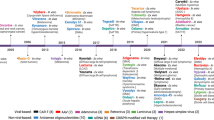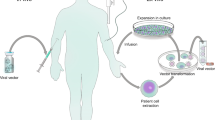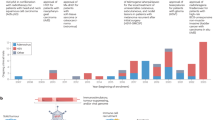Abstract
In prostate carcinoma, overexpression of the anti-apoptotic gene Bcl-2 has been found to be associated with resistance to therapies including radiation and androgen ablation. Restoring the balance of Bcl-2 family members may result in the induction of apoptosis in prostate cancer cells previously resistant to treatment. To accomplish this, a strategy involving overexpression of the pro-apoptotic gene Bax was executed. The use of cytotoxic genes such as Bax require selective expression of the gene. In this study, we examined the ability of selective expression of Bax protein directed by a prostate-specific promoter to induce apoptosis in human prostate carcinoma. A second-generation adenoviral vector was constructed with the modified prostate-specific probasin promoter, ARR2PB, directing expression of an HA-tagged Bax gene and a green fluorescent protein reporter translated from an internal ribosome entry site (ARR2PB.Bax.GFP). ARR2PB promoter activity is tightly regulated and highly prostate specific and is responsive to androgens and glucocorticoids. The prostate-specific promoter-Bax-GFP transgene cassette was inserted into a cloning site near the right inverted terminal repeat of the adenoviral vector to retain specificity of the promoter. LNCaP cells infected with Ad/ARR2PB.Bax.GFP showed high levels of Bax expression 48 h after infection resulting in an 85% reduction in cell viability. Importantly, LNCaP cells stably transfected to overexpress Bcl-2 showed similar patterns of cell death when infected with Ad/ARR2PB.Bax.GFP, an 82% reduction in cell viability seen 48 h after infection. Apoptosis was confirmed by measuring caspase activation and using the TUNEL assay. Tissue specificity was evaluated using A549 cells (lung adenocarcinoma), SK-Hep-1 (liver cancer) cells, and Hela (cervical cancer) cells which did not show detectable expression of virally delivered Bax protein or any increase in cell death. Systemic administration of Ad/ARR2PB. Bax.GFP in nude mice revealed no toxicity in liver, lung, kidney, or spleen. This study shows that infection with the second-generation adenovirus, ARR2PB.Bax.GFP, results in highly specific cytotoxicity in LNCaP cells, and that consequent overexpression of Bax in prostate carcinoma, even in the context of high levels of Bcl-2 protein, resulted in apoptosis. These results suggest that a second-generation adenovirus-mediated, prostate-specific Bax gene therapy is a promising approach for the treatment of prostate cancer. Gene Therapy (2001) 8, 1363–1371.
This is a preview of subscription content, access via your institution
Access options
Subscribe to this journal
Receive 12 print issues and online access
$259.00 per year
only $21.58 per issue
Buy this article
- Purchase on Springer Link
- Instant access to full article PDF
Prices may be subject to local taxes which are calculated during checkout







Similar content being viewed by others
References
Brady H, Gil-Gomez G . Molecules in focus. Bax. The pro-apoptotic Bcl-2 family member, Bax Int J Biochem Cell Biol 1998 30: 647–650
Marcelli M et al. Heterogeneous apoptotic responses of prostate cancer cell lines identify an association between sensitivity to staurosporine-induced apoptosis, expression of Bcl-2 family members, and caspase activation Prostate 2000 42: 260–273
van Brussel JP et al. Chemosensitivity of prostate cancer cell lines and expression of multidrug resistance-related proteins Eur J Cancer 1999 35: 664–671
Srivastava RK, Sasaki CY, Hardwick JM, Longo DL . Bcl-2-mediated drug resistance: inhibition of apoptosis by blocking nuclear factor of activated T lymphocytes (NFAT)-induced Fas ligand transcription J Exp Med 1999 190: 253–265
Ikawa S, Obinata M, Ikawa, Y . Human p53-p51 (p53-related) fusion protein: a potent BAX transactivator Jpn J Cancer Res 1999 90: 596–599
Pearson AS et al. Up-regulation of the prospoptotic mediators Bax and Bak after adenovirus-mediated p53 gene transfer in lung cancer cells Clin Cancer Res 2000 6: 887–890
Xiang J et al. Pro-apoptotic treatment with an adenovirus encoding Bax enhances the effect of chemotherapy in ovarian cancer J Gene Med 2000 2: 97–106
Yagi et al. Proapoptotic gene BAX is frequently mutated in hereditary nonpolyposis colorectal cancers but not in adenomas Gastroenterology 1998 114: 268–274
Ouyang H et al. The BAX gene, the promoter of apoptosis, is mutated in genetically unstable cancers of the colorectum, stomach, and endometrium Clin Cancer Res 1998 4: 1071–1074
Gjertsen BT, Logothetis CJ, McDonnell TJ . Molecular regulation of cell death and therapeutic strategies for cell death instruction in prostate carcinoma Cancer Metastasis Rev 1999 17: 345–351
Adams JM, Cory S . The Bcl-2 protein family: arbiters of cell survival Science 1998 281: 1322–1326
Arafat W et al. An adenovirus encoding proapoptotic Bax induces apoptosis and enhances the radiation effect in human ovarian cancer Mol Ther 2000 1: 545–554
Sakakura C et al. Overexpression of bax sensitizes human breast cancer MCF-7 cells to radiation-induced apoptosis Int J Cancer 1996 67: 101–105
Kagawa S et al. A binary adenoviral vector system for expressing high levels of the proapoptotic gene bax Gene Therapy 2000 7: 75–79
Coll J-L et al. Antitumor activity of bax and p53 naked gene transfer in lung cancer: in vitro and in vivo analysis Hum Gene Ther 1998 9: 2063–2074
Komatsu K et al. Cre-loxP-mediated bax gene activation reduces growth rate and increases sensitivity to chemotherapeutic agents in human gastric cancer cells Cancer Gene Ther 2000 7: 885–892
Rosse T et al. Bcl-2 prolongs cell survival after Bax-induced release of cytochrome c Nature 1998 391: 496–499
Rubinchik S et al. Adenoviral vector which delivers FasL-GFP fusion protein regulated by the tet-inducible expression system Gene Therapy 2000 7: 875–885
Tai Y-T, Strobel T, Kufe D, Cannistra SA . In vivo cytotoxicity of ovarian cancer cells through tumor-selective expression of the BAX gene Cancer Res 1999 59: 2121–2126
Rubinchik S et al. Creation of a new transgene cloning site near the right ITR of Ad5 results in reduced enhancer interference with tissue-specific and regulatable promoters Gene Therapy 2001 8: 247–253
Imler J-L et al. Targeting cell-specific gene expression with an adenovirus vector containing the lacZ gene under the control of the CFTR promoter Gene Therapy 1996 3: 49–58
Shi Q, Wang Y, Worton R . Modulation of the specificity and activity of a cellular promoter in an adenoviral vector Hum Gene Ther 1997 8: 403–410
Zhang J, Thomas T, Kasper S, Matusik R . A small composite probasin promoter confers high levels of prostate-specific gene expression through regulation by androgens and glucocorticoids in vitro and in vivo Endocrinology 2000 141: 4698–4710
Mizuguchi H et al. IRES-dependent second gene expression is significantly lower than cap-dependent first gene expression in a bicistronic vector Mol Ther 2000 1: 376–382
Jo M et al. Apoptosis induced in normal human hepatocytes by tumor necrosis factor-related apoptosis-inducing ligand Nat Med 2000 6: 564–567
Murphy AL . Apoptin: nuclear switch triggers cancer cell death Gene Therapy 1999 6: 713–714
Clarke MF et al. A recombinant bcl-XS adenovirus selectively induces apoptosis in cancer cells but not in normal bone marrow cells Proc Natl Acad Sci USA 1995 92: 11024–11028
Yamabe K et al. Cancer gene therapy using a pro-apoptotic gene, caspase-3 Gene Therapy 1999 6: 1952–1959
Dong Y-B et al. Adenovirus-mediated E2F-1 gene transfer efficiently induces apoptosis in melanoma cells Cancer 1999 86: 2021–2033
Ji L et al. Induction of apoptosis and inhibition of tumorigenicity and tumor growth by adenovirus vector-mediated fragile histidine triad (FHIT) gene overexpression Cancer Res 1999 59: 3333–3339
Kataoka M et al. Down-regulation of bcl-2 is associated with p16INK4-mediated apoptosis in non-small cell lung cancer cells Oncogene 2000 19: 1589–1595
Reed JC, Jurgensmeier JM, Matsuyama S . Bcl-2 family proteins and mitochondria Biochim Biophys Acta 1998 1366: 127–137
Green DR, Reed JC . Mitochondria and apoptosis Science 1998 281: 1309–1312
Xiang J, Chao DT, Korsmeyer SJ . BAX-induced cell death may not require interleukin 1β-converting enzyme-like proteases Proc Natl Acad Sci USA 1996 93: 14559–14563
Marzo I et al. Bax adenine nucleotide translocator cooperate in the mitochondrial control of apoptosis Science 1998 281: 2027–2031
Zamzami N et al. Subcellular and submitochondrial mode of action of Bcl-2-like oncoproteins Oncogene 1998 16: 2265–2282
Shinoura N et al. Relative level of expression of Bax and Bcl-XL determines the celular fate of apoptosis/necrosis induced by the overexpression of Bax Oncogene 1999 18: 5703–5713
Culig Z et al. Mutant androgen receptor detected in advanced stage prostatic carcinoma is activated by adrenal androgens and progesterone Mol Endocrinol 1993 12: 1541–1550
Gleave M, Bruchovsky N, Goldenberg SL, Rennie P . Intermittent androgen suppression for prostate cancer: rationale and clinical experience Eur Urol 1998 34 (Suppl. 3): 37–41
Acknowledgements
We thank Dr Robert J Matusik for the ARR2PB promoter. We thank Janie Nelson for secretarial assistance in preparation of this manuscript. This work was supported by NCI CA69596 to JSN.
Author information
Authors and Affiliations
Rights and permissions
About this article
Cite this article
Lowe, S., Rubinchik, S., Honda, T. et al. Prostate-specific expression of Bax delivered by an adenoviral vector induces apoptosis in LNCaP prostate cancer cells. Gene Ther 8, 1363–1371 (2001). https://doi.org/10.1038/sj.gt.3301531
Received:
Accepted:
Published:
Issue Date:
DOI: https://doi.org/10.1038/sj.gt.3301531
Keywords
This article is cited by
-
Apoptotic and predictive factors by Bax, Caspases 3/9, Bcl-2, p53 and Ki-67 in prostate cancer after 12 Gy single-dose
Scientific Reports (2020)
-
CoCl2 simulated hypoxia induce cell proliferation and alter the expression pattern of hypoxia associated genes involved in angiogenesis and apoptosis
Biological Research (2019)
-
Radiosensitization in prostate cancer: mechanisms and targets
BMC Urology (2013)
-
Lentiviruses with trastuzumab bound to their envelopes can target and kill prostate cancer cells
Cancer Gene Therapy (2009)
-
Gene-modified bone marrow cell therapy for prostate cancer
Gene Therapy (2008)



